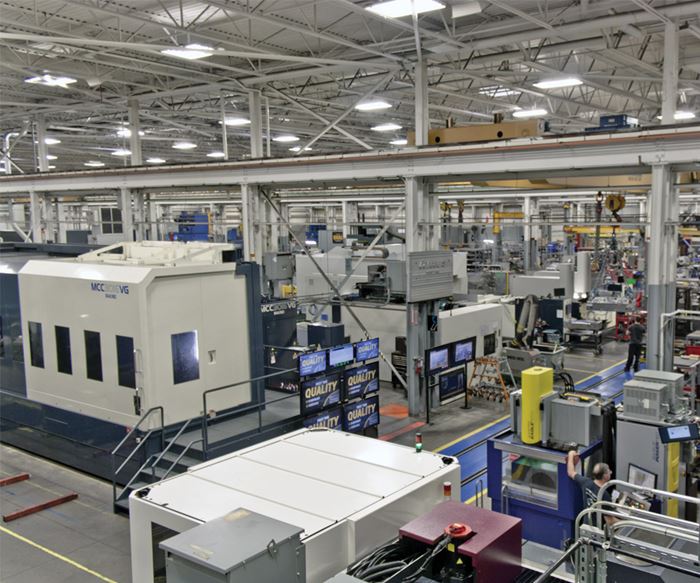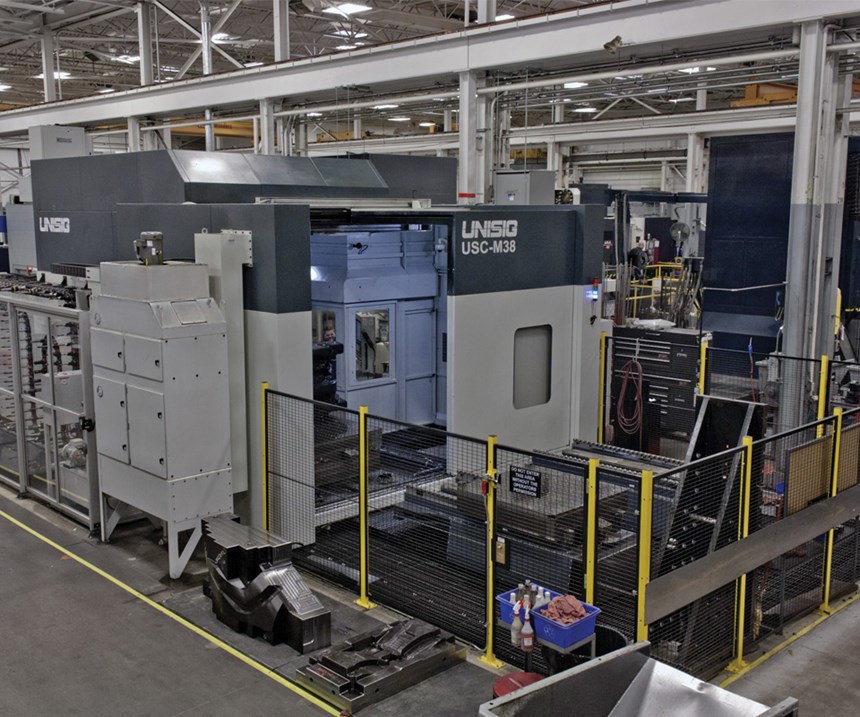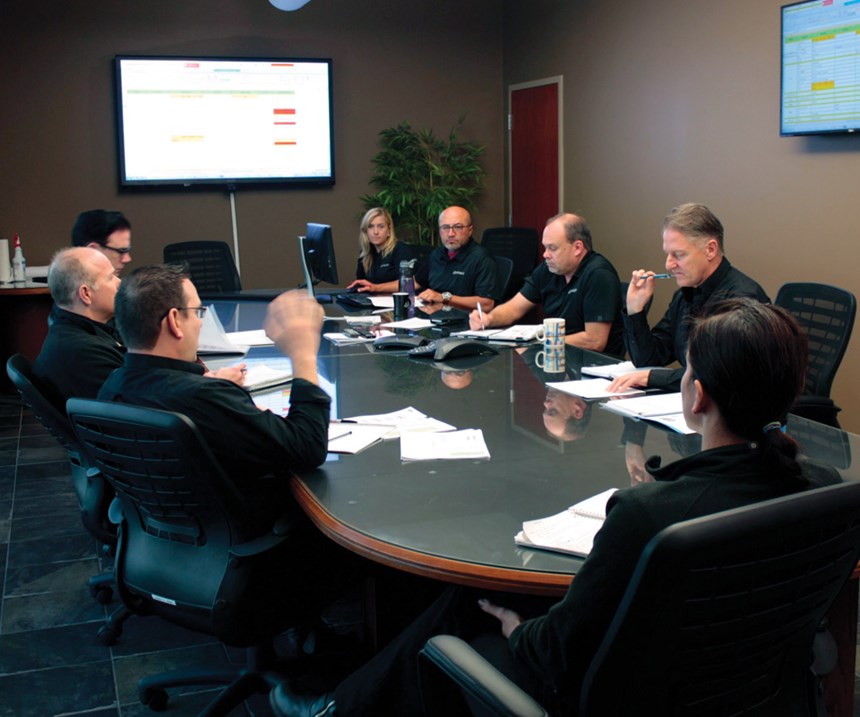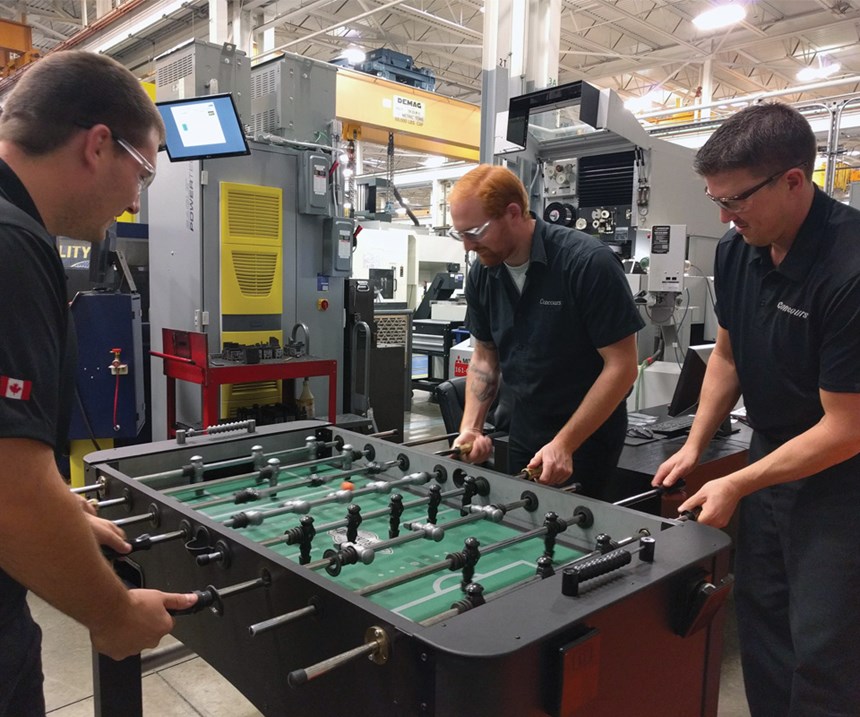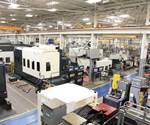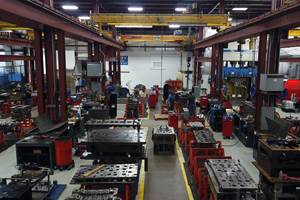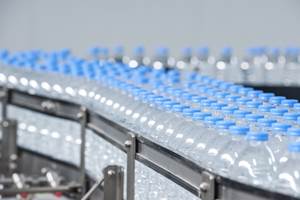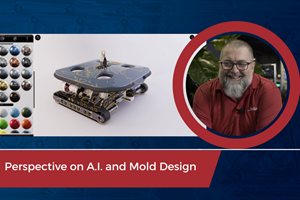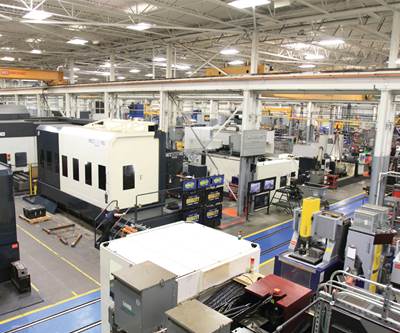2017 Leadtime Leader Awards Honorable Mention: Concours Mold Inc.
This Canadian mold manufacturer identifies teamwork and quality as critical to its ability to drive continued success.
In perusing Concours Mold Inc.’s website or walking through the company’s headquarters in Lakeshore, Ontario, Canada, one gets a very strong message that “team” matters. It’s not just some catchphrase; the shop lives and breathes it. It’s something that, together with a stated goal of “first-time quality,” has enabled the company to maintain high operational standards and long-term employee loyalty. It also has helped make Concours the 2017 Leadtime Leader Honorable Mention shop.
Concours was founded by Mark Goggin in 1994 and is one of the youngest mold manufacturing businesses to win Leadtime Leader honors since the award was established in 2003. According to Ed Ergun, corporate sales manager, the recently retired Goggin adhered to a resolute set of growth objectives for his company, and these are itemized on the Concours website: “Step 1, to make it known in the automotive world that Concours is synonymous with quality; Step 2, to build multiple, standardized, strategically located world-class facilities; and Step 3, to take calculated risks, drive continuous improvement and never accept the status quo.” The first two steps are considered complete, while the third’s status is, and will no doubt continue to be, ongoing. These accomplishments are supported by some notable facts.
“Concours has grown its operations from a two-man, 4,000-square-foot facility in Windsor, Ontario, to one that now employs 260 within a 95,000-square-foot building in Lakeshore,” Ergun says. In addition, over the 22 years since its founding, Concours grew from $500,000 in revenue annually to $90 million. The fact that the company is a direct supplier to General Motors, Ford, Nissan, Chrysler, Tesla, Toyota, Volkswagen, BMW and Mercedes-Benz undoubtedly has much to do with such rapid growth and success. Specialties include designing and building injection, compression and reaction injection molds for interior and exterior automotive parts, but the company also builds molds for heavy-truck components and a variety of consumer products for customers such as Rubbermaid and Electrolux. Lead times range from eight to 24 weeks, depending on the size and complexity of the mold.
Besides Concours’ Canadian headquarters, other locations include Concours Mold Alabama in Cullman, a full-service, 25,000-square-foot mold manufacturing plant with 45 employees that was launched in 2004, plus a third, 31,000-square-foot facility, Concours Mold Mexicana, in Huejotzingo, Puebla, which was established in July 2010 and employs 75. Both the U.S. and Mexico plants were initially created to provide mold repair and maintenance services as well as engineering changes for customers in their respective regions, but the company realized the potential of also offering mold manufacturing services and comprehensive project management, and expanded its teams and facilities in those regions in 2014. Today, each plant’s operations average about 80 percent new-mold builds, and 20 percent engineering changes and repairs.
Standardizing “Concours Elite”
“Concours Mold Canada feeds Alabama and Mexico with engineering support and any other input that may be needed,” Ergun explains. “The staff at each satellite facility is composed of a mix of local and Canadian employees, which is important to maintaining consistency within our culture, processes and communications.” All employees are dubbed members of “Concours Elite,” a team with shared goals and the ability to adapt and adjust with the company’s needs to meet customers’ requirements, he adds. The company employs tools such as Cisco WebEx, GoToMeeting video conferencing, Skype instant messaging and video chat services, and Mikogo desktop sharing and conferencing software to enable real-time communications among its three locations so that critical job details are always up to date and deadlines are met. These communication tools are also used to communicate regularly with customers to provide real-time progress reports, discuss any challenges or engineering changes, and so on—sometimes right on the shop floor. All three of the Concours plants operate 24/7 to provide customers with convenient, expeditious service, plus the company maintains a fleet of trucks, including several tractor trailers, and drivers ready to pick up and deliver molds virtually anywhere in North America.
Ergun says the most recent recession caused a gap in finding experienced moldmakers, but that gap is slowly closing, and by offering perks to employees such as no mandatory weekends, “continental shifts” and profit sharing, Concours is able to keep good employees and bring new ones to the table. “It’s hard to keep the guys you have; the point is to find a system that everybody can live with,” he says. “Everyone is obligated to work a minimum of 40 hours weekly, but we do occasionally ask them to work more, and they can say no. Here, the guys who want to work extra hours can, even Saturdays and Sundays if they wish. Flexible working hours for those who need it, as long as they get their minimum 40 hours in each week and work is being performed as required, is OK with us.”
Ergun says Concours no longer has set work shifts for all employees, because that type of system didn’t work very well. Instead, continental shifts, which are an alternative to the more commonly used “metropolitan plan” for shops running 24/7 using eight-hour shifts, allow employees to work Friday, Saturday and Sunday, 12 hours each day, and then take the rest of the week off. “They work 36 hours a week, but they get paid for 40, because they are working longer shifts and giving up their weekends. It helps the shop out, and, of our 425 employees (among the three locations), as many as a dozen employees opt to work continental shifts because it works best for them and their families,” he explains. As for profit sharing, if Concours makes money, employees receive a semi-annual profit-sharing check. The size of this bonus depends on the years an employee has worked at the company, and his or her wage level, he says.
Cultivating an Elite Team
Currently, Concours employs 12 apprentices at its Canadian facility, four at its Alabama plant and five at its Mexico location. “We believe in on-site training and immersion programs to keep our teams prepared to do their best-possible work,” Ergun says. All apprentices are enrolled at St. Clair College in Windsor, Ontario, in either a two- or three-year training program, depending on courses they have taken in high school. Apprentices are required to pay $400 out of their own pockets towards tuition and books, and the Canadian government subsidizes the $2,200 balance. If the apprentices maintain a grade point average of 75 percent or better, Concours will reimburse them each $200, plus they are eligible to receive wages for hours missed at work while they are attending school.
In the shop, apprentices are given a 54-section workbook that Ergun says must be filled out before they can graduate. “All apprentices will spend time with each Concours group leader to learn that leader’s specialty,” he says. “As apprentices acquire proficiency at each specialty, they must earn a signature in their books from that leader before they can move on to the next group leader and receive training in another area.” Once the apprentices complete and pass their college courses and obtain the minimum 7,840 shop hours, plus signatures from their immersion training, they can take the Canadian-government-issued exam to become officially registered moldmakers.
“We train and invest in our employees, and we are always on the lookout to hire good, experienced people that would like a rewarding job with stability,” Ergun says. Besides flexible working hours, optional weekend shifts and profit sharing, Concours employees enjoy organized company outings and other benefits, including an in-house yoga studio; daily walking activities; barbeque, popcorn and pizza days; foosball tournaments; and annual summer and Halloween parties.
Mandating Elite Quality
From training apprentices and employees to be among the best in the industry to trialing molds and beyond, Ergun says Concours works to optimize customers’ outcomes, hence the company’s promise of “first-time quality.” Among its three facilities, Concours employs 24 program managers who meet weekly to review every job in detail, and who help keep customers connected and up to date on projects. “We also use JobPack production scheduling software, which, together with our home-grown ERP system, monitors every component during the mold build to ensure we are on schedule,” he adds. “We rarely deliver tools early due to the very aggressive timing we need to provide when quoting the work, however, we are 95 percent successful, if not better, at hitting the agreed-upon timing when all information has been provided on time for all tools built.”
A core group of 48 in-house engineers also helps Concours deliver robust, well-designed molds. The company’s design team uses CATIA software to design interactive 3D models that will produce custom molds to customers’ specifications.
Having advanced equipment in place also helps Concours reach its quality and lead time objectives, Ergun says, and the company’s machining manager is charged with keeping leadership up to date on the latest machinery and best practices introduced in the industry. “We invest a lot of time and money to verify any opportunity out there to save time and money, which will help keep us at the forefront of our industry,” he says. For example, all of Concours’ newer machines often run more than 79 percent of every day using shuttle tables, pallet pools and lights-out capabilities. In Canada, Concours employs 49 key machines and pieces of equipment, and its U.S. and Mexico facilities have 35 between them (see sidebar on page 20 for details).
“We are always on the lookout for the next big breakthrough in machinery and equipment, and we are willing to test it out and implement it if it means a more streamlined manufacturing process, better-quality parts and reduced lead times to our customers,” Ergun says, adding that Concours employees are encouraged to make suggestions for continuous improvement. “Often new processes or ideas come from our very own employees.”
Some of the latest technological additions to Concours’ operations include the use of radio frequency identification (RFID) for better, more accurate tooling management; large-capacity (accommodating blocks ranging to 15 tons) pallet pool systems from DMG MORI for unattended machining; and implementation of automatic probing cycles for part pickup as well as in-process part verification through the use of a Renishaw coordinate measuring machine (CMM). Both of these processes are performed before the workpiece comes off the machine.
“Having true five-axis machining centers like our Promac Sharav GVT with its generously sized table, as well as 3+2 machines at our disposal, provides the extra edge that we need to produce parts that would otherwise be inconceivable with conventional machining processes,” Ergun says. Newer additions include DMG MORI 80 and 210 machining centers, as well as large-capacity MCC-VG finishing machines that Ergun says give Concours both speed and accuracy without sacrificing quality. The recent purchase of two Unisig multitasking machining stations makes it possible for Concours to set up a workpiece once and complete boring-mill work, CNC cutting and BTA high-speed gundrilling, which he says is four times faster than conventional gundrilling. The company also uses EDM technologies such as adaptive burning, where an EDM sinker controller continuously monitors conditions in the gap and compensates for any contamination to keep it clear as it burns to what is programmed, and high-speed rib burning, which is said to burn faster and cleaner without compromising electrode size.
Finally, customers can conduct full-scale production simulations at the Canada plant using Concours’ four molding machines, which range in capacity between 225 and 3,300 tons. Two six-axis robots networked to the 3,300-, 2,000- and 1,000-ton injection molding machines verify that production goals are being met before molds are shipped.
When asked about how Concours responds to its competition, Ergun says, “We do not review others’ actions to decide our direction. Our quality and service has made us known in the industry, and new customers reach out to us because of this.” Concerning future plans for growth, it’s clear Concours sets its own pace. “We are content with the size of our company at the moment, but we would like all three of our facilities to operate at, or as close to, full capacity all year round.”
Related Content
Precision Meets Innovation at IMTS 2024
After attending IMTS, it's clear that the integration of advanced technologies is ready to enhance precision, efficiency and automation in mold manufacturing processes. It’s a massive event, so here’s a glimpse of what the MMT team experienced firsthand.
Read MoreIndiana Mold Builder Decatur Mold Offers a History of Grit and a Future of Innovation
Decatur Mold Tool and Engineering Inc. serves as a tooling tour guide, helping busy tooling managers reduce uncertainty, lighten workload.
Read MoreWhat is Driving Mold Lifecycle Management Digitalization?
OEMs are looking to partner with suppliers to share and track data across the supply chain for advanced intervention and process management.
Read MoreVIDEO: Perspective on A.I. and Mold Design
Bill Genc of TopSolid shares his perspective on the benefits of and barriers to using artificial intelligence in mold design.
Read MoreRead Next
Concours Technologies (Formerly Concours Mold Inc.)
This conversation with the Canadian shop offers a snapshot of its operations.
Read MoreHow to Use Continuing Education to Remain Competitive in Moldmaking
Continued training helps moldmakers make tooling decisions and properly use the latest cutting tool to efficiently machine high-quality molds.
Read MoreAre You a Moldmaker Considering 3D Printing? Consider the 3D Printing Workshop at NPE2024
Presentations will cover 3D printing for mold tooling, material innovation, product development, bridge production and full-scale, high-volume additive manufacturing.
Read More
